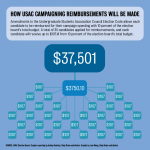Candidates who applied for reimbursements for this year’s undergraduate student government election campaign spendings will receive about $100.
Thirty-five of the 39 candidates who ran in this year’s Undergraduate Students Association Council election applied to be reimbursed for their campaign spending. Each candidate will receive up to $107.14 from 10 percent of the election board’s $37,501 total budget.
The USAC Election Board made an amendment to the election code in March that allows 10 percent of the election board’s total budget to be used for reimbursing candidates’ campaign spending. Each candidate was required to submit expense account forms, which listed items candidates purchased, and sources of funding forms, which documented donations candidates received. The forms were due with receipts on April 20 and April 29, respectively, by 11:59 p.m. to ensure that expenses were recorded throughout the campaign.
Jayesh Menon, the election board’s finance committee director, said the election board worked with the USAC Student Government Accounting office by submitting additional documents to verify how much candidates spent during the election.
“SGA requires a requisition form and physical receipts of the expenditure, so my team is filling out requisition forms for all the candidates that submitted expenditures, including all the receipts they gave us as part of that form,” Menon added.
Pratik Malshe, chairperson for the Finance Committee, said expenses must have followed campaign guidelines in order to be reimbursed. For example, all purchased campaign items must include the election board logo.
Malshe said SGA will be using receipts to verify expenditures. He added items that can be reused outside campaigning purposes will not be reimbursed.
“Payments for graphics, flyers and any sort of supplies (candidates) required, like pens and pencils, are able to be reimbursed,” he said. “Items, such as tables and chairs, that have long-term use cannot be refunded because student government offices use other sources of funding to buy those items and fund events.”
The election board said they think the amendment will disincentivize candidates from overspending in the election because they will only be reimbursed for a fraction of their spending.
However, candidates who ran in this year’s undergraduate student government election said the reimbursement policy did not affect how much they spent on campaigning.
Nicole Corona Diaz, a former general representative who ran for the external vice president position, said the reimbursement policy had little effect on her campaign spending.
“It was a nice thing to look forward to, but at the end of the day with so many candidates running, I think the fraction of money that candidates are ultimately going to receive is going to be very small,” she said.
Ayesha Haleem, a general representative elected in this year’s undergraduate election, said the reimbursement policy has made her feel financially insecure because she has had to wait a long time for the reimbursement.
“I was thinking about money constantly, but in the back of my mind I felt like I was losing the $600 because I was unsure how much of it I was going to get back until now,” Haleem said.
Candidates said they felt that the election code’s $600 spending limit forced them to be creative in how they managed their money.
“Making sure candidates had only $600 was a good way to make sure everyone was on an even ground,” Haleem said. “It forced me to be innovative. For instance, I spent more money on blue books to attach to my flyers to make people stop and take them.”
Corona Diaz said that she searched for ways to cut costs by reaching out to family and friends.
“It made us outreach to find networks and ask them what they would be able to give us for free, a nonmonetary, item donation,” she added.
Corona Diaz said she was able to build her signboard with wood and paper friends and family gave her for free.
Candidates may not receive their reimbursements until after finals week, Malshe said.
“Requisition deadlines were on April 27, and given the fact the election board is turning them in after that, candidates can expect to receive their reimbursement in three to four weeks after they are submitted,” he said.
Candidates will be able to collect their reimbursements at the SGA office or have them mailed to their home addresses.
Candidates said reimbursements could make elections more equitable in the future and allow more students to run for USAC positions.
“I think that (the reimbursement policy) is a good start, and in writing it makes it accessible for more students to run, but at the end of the day, it needs to be able to subsidize more of the cost of the campaign than just a tiny bit of it,” Corona Diaz said.
